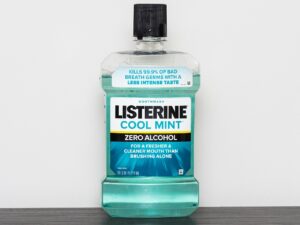Have you been wondering why your teeth hurt when eating sweets? For instance, say you take a sip of sweetened orange juice, do you immediately feel an intense stabbing pain in your teeth? Or when you bite into a gummy bear, do you get a tingling sensation or a dull ache in your teeth? If any of this sounds familiar, here’s what could be causing the problem and how to fix it.
Why is sugar bad for teeth?
Let’s get one thing straight. Sugar is not good for teeth. Sugary foods and drinks interact with bacteria in plaque and produce acid, which causes tooth decay. Meaning, eating a lot of sugary foods over time can slowly lead to the dissolving of tooth enamel. This, in turn, can lead to the formation of cavities (holes) in your teeth. Left untreated, tooth decay can cause infections such as tooth abscesses, and ultimately, tooth loss.
What makes teeth hurt when eating sweets?
The most common cause that makes your teeth hurt when eating sweets is a loss of enamel, which makes your teeth sensitive. The loss of enamel occurs due to tooth decay when the bacteria in plaque are fed on a constant supply of sugar from the foods and drinks you consume. It leads to the formation of cavities (holes) in your teeth, which expose the nerves inside your teeth. This makes your teeth more sensitive to hot and cold foods, but also sugary foods and drinks. That’s why your teeth hurt when eating sweets.
Which sweets makes teeth hurt the most?
Common culprits that make teeth hurt when eating sweets include:
- Hard boiled candy that stays in your mouth for a long time.
- Sticky sweets that adhere to your teeth and allow bacteria to multiply.
- Sugary drinks like orange juice that also contain natural citric acid.
- Carbonated drinks like colas that are both sugary and acidic.
Why do my teeth hurt when I eat sweets even though I have no cavities?
If you don’t have tooth decay (cavities) and your teeth hurt when eating sweets, it could be because of:
Gum disease
Plaque buildup can not only damage your teeth but also cause gum disease. Left untreated, plaque can harden into tartar, which can cause pain, swelling, and bleeding gums. This can lead to exposure of the tooth roots and increased tooth sensitivity.
Receding gums
As we grow older, our gums tend to recede, exposing more of the tooth roots. Habits such as smoking can accelerate this process. Receding gums can lead to teeth sensitivity and make your teeth hurt when eating sweets.
Teeth whitening treatments
Overuse of home teeth-whitening kits or substances such as hydrogen peroxide to remove stains can damage the dentin in your teeth (Don’t know what is dentin? Read this blog on the different parts of a tooth). Damage to dentin can lead to increased sensitivity in your teeth, causing discomfort or pain when eating sweets.
How do you stop your teeth from hurting when eating sweets?
How you can stop teeth from hurting when eating sweets depends on the cause. You should make an appointment to see your dentist as soon as possible if you have a sharp, stabbing, intense pain or a dull ache in your teeth after eating sweets. Also, if you get a tingling sensation in your teeth after eating or drinking something sweet.
Your dentist will get to the bottom of what’s going on. If cavities are making your teeth hurt when eating sweets, there are effective treatments for tooth decay available. Similarly, gum disease (gingivitis and periodontitis) should be treated without delay to prevent serious complications. Treatment for receding gums includes deep cleaning and scaling. Sensitivity due to teeth whitening can be managed by temporarily refraining from whitening treatments and avoiding sweets and hot and cold drinks for some time. Your dentist may recommend dental sealants to alleviate your symptoms of teeth hurting when eating sweets.
How to prevent tooth damage from sugary foods and drinks?
Prevention is better than cure. Here are some tips to prevent tooth damage from sugars:
- Avoid eating and drinking sugar as much as possible. Struggling to do this? Here are some tips on how to quit sugar.
- Brush your teeth twice a day and floss daily.
- Rinse your mouth or brush your teeth after eating foods that are high in sugars.
- Avoid snacking throughout the day and limit eating and drinking to mealtimes.
- Use sugarless chewing gum instead of hard candies.
The most important thing you can do to maintain good oral health is to see your dentist every 6 months. This way any dental issues will be diagnosed and treated in a timely manner before they start causing severe problems. Don’t ignore a symptom such as teeth hurt when eating sweets. Express Dentist can connect you to dental professionals in your area who are accepting new patients. Call us today and get relief from your symptoms.
About the author

Dr. Greg Grillo
Dr. Greg Grillo DDS studied at the University of Washington where he received a bachelors degree with Honors and later attended dental school on the same campus. Following school Dr. Greg served in the United States Navy as a dental officer. During this time he received advanced training in specialty areas of dentistry while also treating families of members of the military.
As well as sharing valuable information on dentistry and oral health, Dr. Greg remains a practicing dentist to this day. He works with families in the Okanogan Valley where he lives with his wife and three children.
- Dr. Greg Grillo
- Dr. Greg Grillo
- Dr. Greg Grillo
- Dr. Greg Grillo
- Dr. Greg Grillo
- Dr. Greg Grillo
- Dr. Greg Grillo
- Dr. Greg Grillo
- Dr. Greg Grillo
- Dr. Greg Grillo
- Dr. Greg Grillo
- Dr. Greg Grillo
- Dr. Greg Grillo
- Dr. Greg Grillo
- Dr. Greg Grillo
- Dr. Greg Grillo
- Dr. Greg Grillo
- Dr. Greg Grillo
- Dr. Greg Grillo
- Dr. Greg Grillo
- Dr. Greg Grillo
- Dr. Greg Grillo
- Dr. Greg Grillo
- Dr. Greg Grillo
- Dr. Greg Grillo
- Dr. Greg Grillo
- Dr. Greg Grillo
- Dr. Greg Grillo
- Dr. Greg Grillo
- Dr. Greg Grillo
- Dr. Greg Grillo
- Dr. Greg Grillo
- Dr. Greg Grillo
- Dr. Greg Grillo
- Dr. Greg Grillo
- Dr. Greg Grillo
- Dr. Greg Grillo
- Dr. Greg Grillo
- Dr. Greg Grillo
- Dr. Greg Grillo
- Dr. Greg Grillo
- Dr. Greg Grillo
- Dr. Greg Grillo
- Dr. Greg Grillo
- Dr. Greg Grillo
- Dr. Greg Grillo
- Dr. Greg Grillo
- Dr. Greg Grillo
- Dr. Greg Grillo
- Dr. Greg Grillo
- Dr. Greg Grillo
- Dr. Greg Grillo
- Dr. Greg Grillo
- Dr. Greg Grillo
- Dr. Greg Grillo
- Dr. Greg Grillo
- Dr. Greg Grillo
- Dr. Greg Grillo
- Dr. Greg Grillo
- Dr. Greg Grillo
- Dr. Greg Grillo
- Dr. Greg Grillo
- Dr. Greg Grillo
- Dr. Greg Grillo
- Dr. Greg Grillo
- Dr. Greg Grillo
- Dr. Greg Grillo
- Dr. Greg Grillo
- Dr. Greg Grillo
- Dr. Greg Grillo
- Dr. Greg Grillo
- Dr. Greg Grillo
- Dr. Greg Grillo
- Dr. Greg Grillo
- Dr. Greg Grillo
- Dr. Greg Grillo
- Dr. Greg Grillo
- Dr. Greg Grillo
- Dr. Greg Grillo
- Dr. Greg Grillo
- Dr. Greg Grillo
- Dr. Greg Grillo
- Dr. Greg Grillo
- Dr. Greg Grillo
- Dr. Greg Grillo
- Dr. Greg Grillo
- Dr. Greg Grillo
- Dr. Greg Grillo
- Dr. Greg Grillo
- Dr. Greg Grillo
- Dr. Greg Grillo




